Unit 5 Visiting the Moon Grammar 课件
文档属性
| 名称 | Unit 5 Visiting the Moon Grammar 课件 | 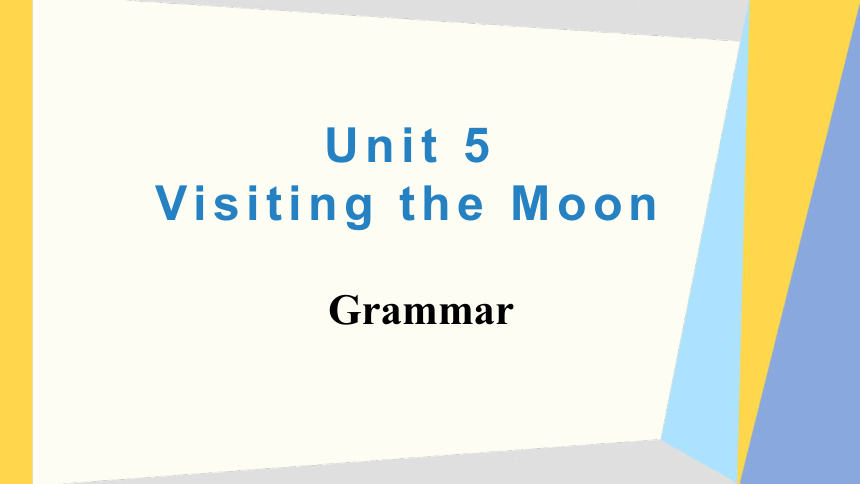 | |
| 格式 | zip | ||
| 文件大小 | 2.6MB | ||
| 资源类型 | 试卷 | ||
| 版本资源 | 牛津深圳版 | ||
| 科目 | 英语 | ||
| 更新时间 | 2023-03-16 21:41:53 | ||
图片预览

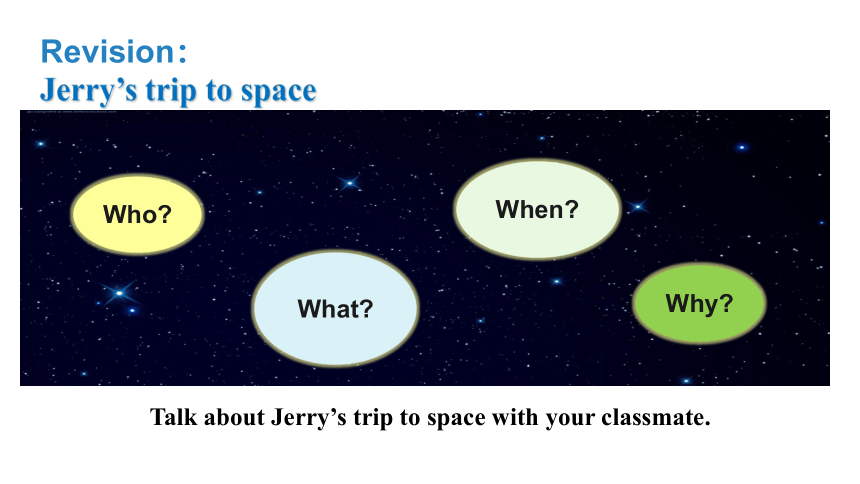
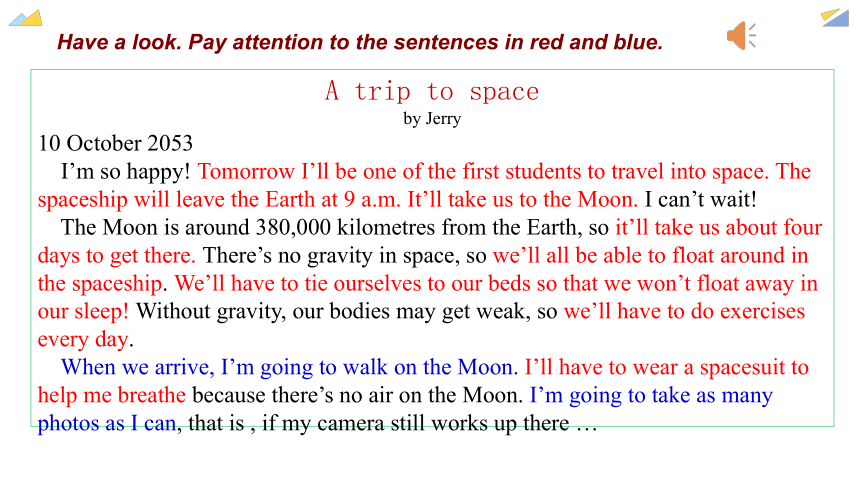
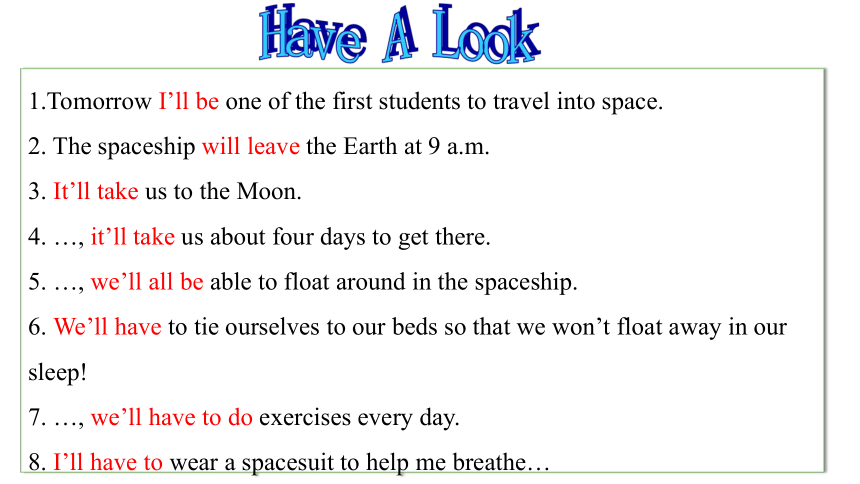
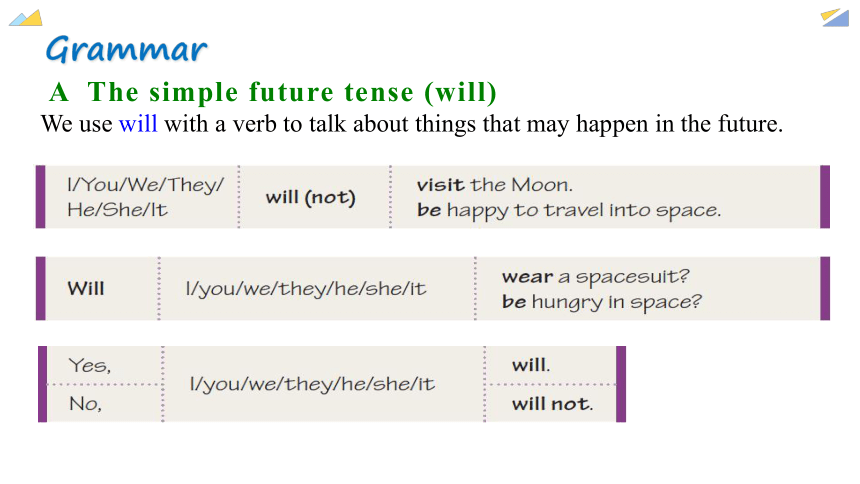
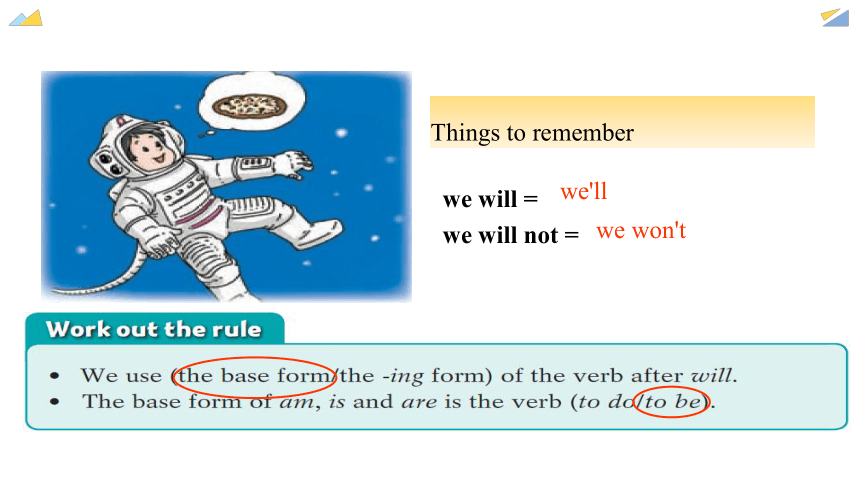
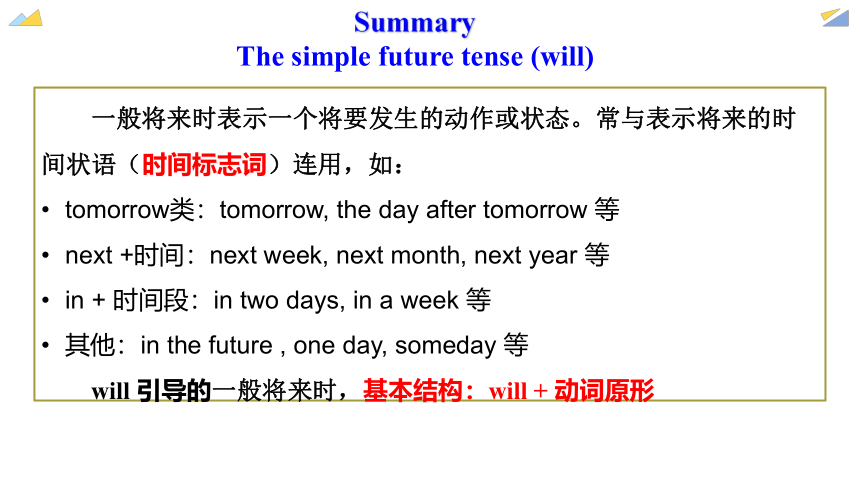
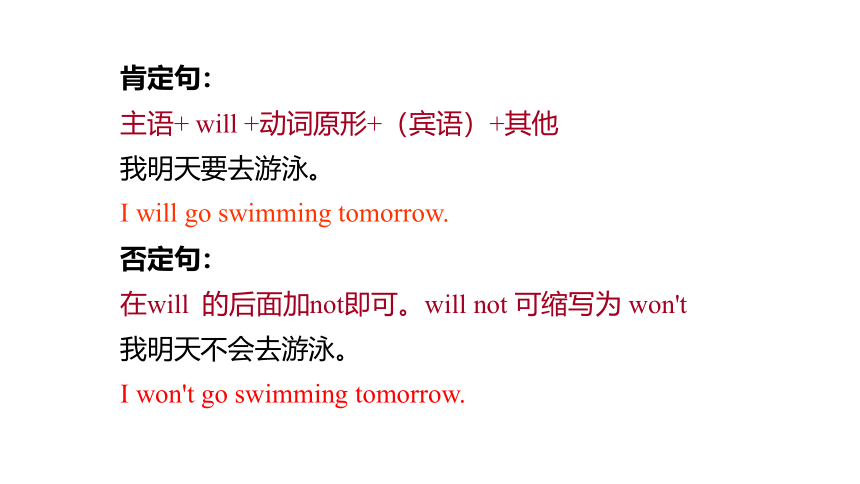
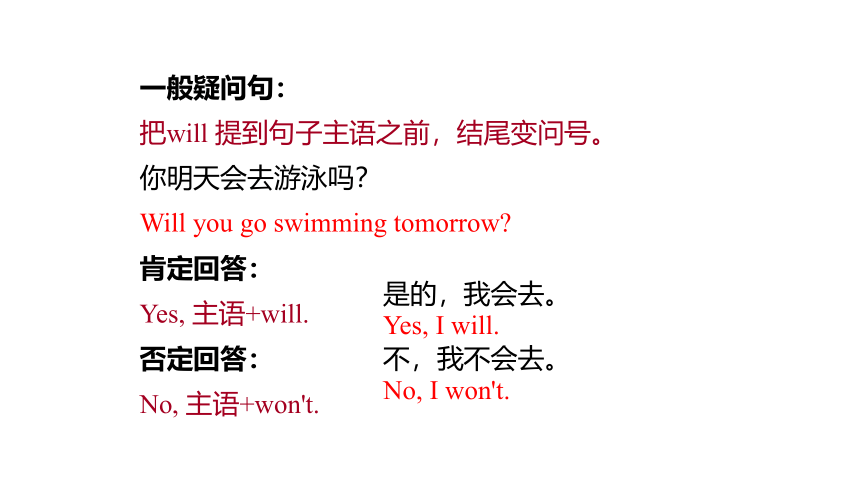
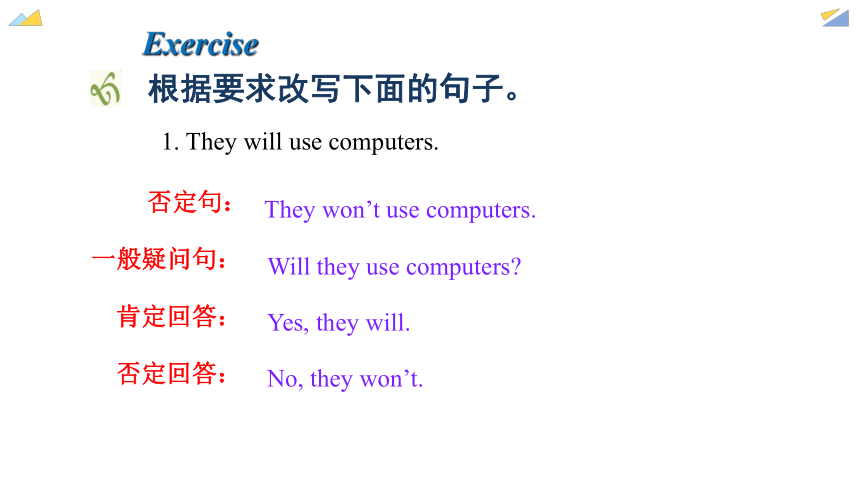
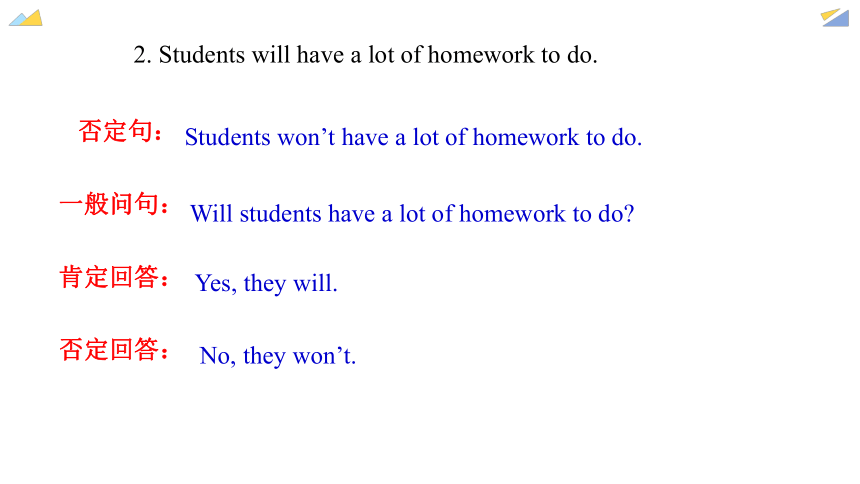
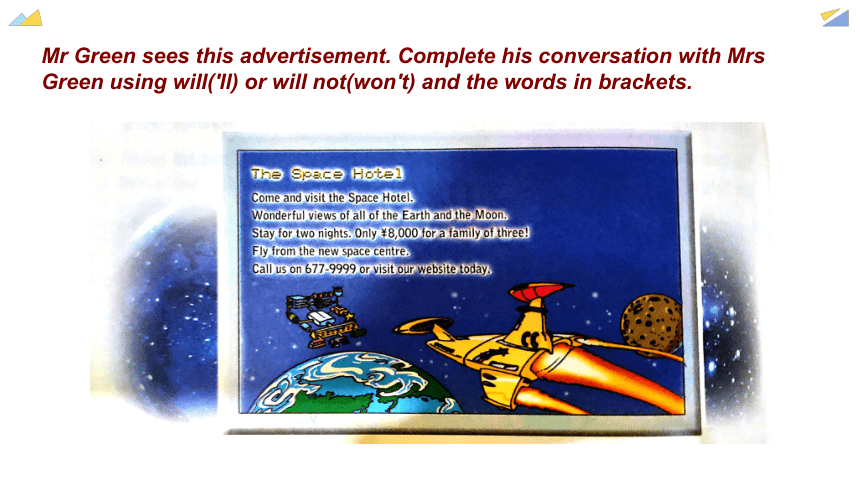
文档简介
(共30张PPT)
Unit 5
Visiting the Moon
Grammar
Revision:
Jerry’s trip to space
Who
What
When
Why
Talk about Jerry’s trip to space with your classmate.
A trip to space
by Jerry
10 October 2053
I’m so happy! Tomorrow I’ll be one of the first students to travel into space. The spaceship will leave the Earth at 9 a.m. It’ll take us to the Moon. I can’t wait!
The Moon is around 380,000 kilometres from the Earth, so it’ll take us about four days to get there. There’s no gravity in space, so we’ll all be able to float around in the spaceship. We’ll have to tie ourselves to our beds so that we won’t float away in our sleep! Without gravity, our bodies may get weak, so we’ll have to do exercises every day.
When we arrive, I’m going to walk on the Moon. I’ll have to wear a spacesuit to help me breathe because there’s no air on the Moon. I’m going to take as many photos as I can, that is , if my camera still works up there …
Have a look. Pay attention to the sentences in red and blue.
1.Tomorrow I’ll be one of the first students to travel into space.
2. The spaceship will leave the Earth at 9 a.m.
3. It’ll take us to the Moon.
4. …, it’ll take us about four days to get there.
5. …, we’ll all be able to float around in the spaceship.
6. We’ll have to tie ourselves to our beds so that we won’t float away in our sleep!
7. …, we’ll have to do exercises every day.
8. I’ll have to wear a spacesuit to help me breathe…
Have A Look
A The simple future tense (will)
We use will with a verb to talk about things that may happen in the future.
Grammar
Things to remember
we will =
we will not =
we'll
we won't
Summary
The simple future tense (will)
一般将来时表示一个将要发生的动作或状态。常与表示将来的时间状语(时间标志词)连用,如:
tomorrow类:tomorrow, the day after tomorrow 等
next +时间:next week, next month, next year 等
in + 时间段:in two days, in a week 等
其他:in the future , one day, someday 等
will 引导的一般将来时,基本结构:will + 动词原形
肯定句:
主语+ will +动词原形+(宾语)+其他
我明天要去游泳。
I will go swimming tomorrow.
否定句:
在will 的后面加not即可。will not 可缩写为 won't
我明天不会去游泳。
I won't go swimming tomorrow.
一般疑问句:
把will 提到句子主语之前,结尾变问号。
你明天会去游泳吗?
Will you go swimming tomorrow
肯定回答:
Yes, 主语+will.
否定回答:
No, 主语+won't.
是的,我会去。
Yes, I will.
不,我不会去。
No, I won't.
1. They will use computers.
否定句:
一般疑问句:
肯定回答:
否定回答:
They won’t use computers.
Will they use computers
Yes, they will.
No, they won’t.
根据要求改写下面的句子。
Exercise
2. Students will have a lot of homework to do.
否定句:
一般问句:
肯定回答:
否定回答:
Students won’t have a lot of homework to do.
Will students have a lot of homework to do
Yes, they will.
No, they won’t.
Mr Green sees this plete his conversation with Mrs Green using will('ll) or will not(won't) and the words in brackets.
Mr Green: Let's visit the Space Hotel for our next holiday!
Mrs Green: That‘s a good idea. What ___________(we/see) from there
Mr Green: ______________ (We/see) all of the Earth.
Mrs Green: __________(we/see) Mars
Mr Green: No, ________________(we/not), but ________________
(there/be) wonderful views of the Moon.
Mrs Green: How _______________(we/get) to the hotel
Mr Green: _________________(We/fly) up to the hotel in a spaceship.
Mrs Green: ______________(Tim/be) with us
Mr Green: Oh, yes, let's take him too. _________________(He/enjoy) it.
will we see
We will/We'll see
Will we see
we will not/won't
there will/there'll be
will we get
We will/We'll fly
Will Tim be
He will/He'll enjoy
1. When we arrive, I’m going to walk on the Moon.
2. I’m going to take as many photos as I can,…
3. I’m going to walk on the Moon.
4. She is going to take as many photos as I can.
5. We are not going to be back to the Earth next week.
6. He is not going to walk on the Moon.
Have A Look
B The simple future tense(be going to)
We can use the pattern be + going to + a verb to talk about future plans.
Summary
The simple future tense(be going to)
be going to 引导的一般将来时,表示某人打算或准备做的事情或即将发生的事。相当于“打算、计划、准备”。基本结构:
be going to + 动词原形
肯定句:
主语+be going to+动词原+……
我明天要去购物。
I am going to go shopping tomorrow.
否定句:
主语+be not going to +动词原形
我明天不会去购物。
I am not going to go shopping tomorrow.
一般疑问句:
be+主语+going to +动词原形…?
肯定回答:
Yes, 主语+be.
否定回答:
No, 主语+be not.
你明天会去购物吗?
Are you going to go shopping tomorrow
是的,我会去。 不,我不会去。
Yes, I am. No, I am not.
be 的形式要注意,它要随着人称变;
否定句,很简单,not 加在 be 后面;
疑问句,需牢记,be 应提到主语前。
I’m going to tell
Mr Green wants to visit the Space Hotel. He is telling his son about his plan. Complete the conversation using be(not)going to and the words in brackets.
Mr Green: Come here, Tim. ______________(I/tell) you something exciting!
_________________ (We/have) a holiday in the Space Hotel!
Tim: Great! ___________________ (we/drive) our car there
Mr Green: No,______________________ (we/not drive) our car there!
___________________ (We/travel) in a spaceship!
Tim: Are the dogs going to come with us
Mr Green: No. ____________________ (They/stay) here.
Tim: _________________________(Aunt Alice /be) here every day to
feed them
Mr Green: Yes, __________(she/be).
We are going to have
Are we going to drive
we’re not going to drive
We’re going to travel
They’re going to stay
Is Aunt Alice going to be
she is
be going to 与 will 两者都可表示将要发生的事, 但它们有如下几点区别:
1. be going to 表示近期、眼下就要发生的事情;
will 表示的将来时间则较远一些。
He is going to write a letter tonight.
He will write a book one day.
2. be going to 表示根据主观判断将来肯定发生的事(表示有迹象要发生某事)
will表示客观上将来势必发生的事.
He is outstanding. He is going to succeed.
He will be twenty years old.
一、be going to 与 will 的区别
知识拓展:
3. be going to 含有“计划, 准备”的意思,
而 will 则没有这个意思,如:
She is going to lend us her books.
He will be here in half an hour.
4. 在有条件从句的主句中, 一般不用 be going to,
而多用will/shall进行预测。 (即如果一事发生,另一事也就发生)
If the telephone rings, I will answer it.
在时间状语从句和条件状语从句中,如果主句是一般将来时,从句用一般现在时替代一般将来时。
主要标志有:if 、unless 、until、 when 、as soon as
如: 他一来我就会告诉他这件事。
I will tell him about it as soon as he comes.
如果明天天气好,我们就会出去。
If it is fine tomorrow, we will go outing.
There will be+主语+...或There is/are going to be+主语+...
明年这有将有一个大型超市。
______ _____ ____a supermarket here next year.
_____ _____ ____ ____ _____a supermarket here next year.
There will be
There is going to be
二、“主将从现”原则
三、there be 的一般将来时。
Exercise
Hello, everyone. The winter holiday is coming. I’m so excited because I have a great plan for it.
Firstly, I __________________ (read) books and keep a diary every day. This can help me learn more about the world and know more about myself. Secondly, I _________________ (make) some new friends. I always enjoy the time with my friends, so making new friends will make me even happier. Finally, I __________________ (join) an Environmental Club. As is known, the Earth is in great danger now. Therefore, I hope I can do more things to protect the Earth.
I am looking forward to my coming winter holiday. And I’m sure I _________ (enjoy) myself.
Fill in the blanks with will, be going to and the words in brackets.
am going to read
am going to make
am going to join
will enjoy
1. I will tell you something interesting.(改为同义句)
______ ______ ______ ______ ______ you something interesting.
2. We are not going to travel this winter holiday. (改为同义句)
______ ______ ______ this winter holiday.
3. Tom is going to move to Guangzhou next month. (就划线部分提问)
______ ______ Bobby ______ ______ ______ to Guangzhou
4. They will spend their holiday in New York. (就划线部分提问)
______ ______ they ______ their holiday
5. I am going to go to school on foot tomorrow. (就划线部分提问)
______ ______ you ______ ______ ______ to school in the country
I am going to tell
We won’t travel
How are going to go
Exercise time.
Where will spend
When is going to move
6. 汤姆和妹妹这个周末不打算出去玩。
Tom and his sister _____ ______ ____ ____outside this weekend.
7. 我在新学校将会有很多新朋友。
I ____ ____ many new friends at the new school.
8. 下周六这里将有一场时装表演。
_____ _____ _____ a fashion show
here next Saturday.
9. 明天下午将会有个会议。
_____ _____ _____ _____ _____ a meeting tomorrow afternoon.
10. 这个周末你有空吗?
_____ you _____ free this weekend
aren’t going to play
will have
There will be
There is going to be
Will be
1. -How are they ____ to ____ there tomorrow
-By bus.
A. go, going B. getting, go
C. going, get D. get, going
2.He is going _____ tomorrow afternoon.
A. to go here B. to come here
C. go there D. there
3.The students are going _____ have their
first field trip.
A. in B. to C. at D. on
4.What _____ we _____ this morning
A. does, do B. will, does
C. shall, do D. shall, doing
5.There _____ a game in our class tomorrow.
A. will be B. is
C. has D. being
6. If they come, we ________ a meeting.
A. have B. will have
C. had D. would have
7. He _______ to us as soon as he gets there.
A. writes B. has written
C. will write D. wrote
8. He ________ in three days.
A. coming back B. came back
C. will come back D. is going to coming back
Homework.
Review what has learned today.
Finish the relevant exercise of Grammar in Student Times.
Try to write your plan for the coming weekend or next year, using the simple future tense.
THANKS
Unit 5
Visiting the Moon
Grammar
Revision:
Jerry’s trip to space
Who
What
When
Why
Talk about Jerry’s trip to space with your classmate.
A trip to space
by Jerry
10 October 2053
I’m so happy! Tomorrow I’ll be one of the first students to travel into space. The spaceship will leave the Earth at 9 a.m. It’ll take us to the Moon. I can’t wait!
The Moon is around 380,000 kilometres from the Earth, so it’ll take us about four days to get there. There’s no gravity in space, so we’ll all be able to float around in the spaceship. We’ll have to tie ourselves to our beds so that we won’t float away in our sleep! Without gravity, our bodies may get weak, so we’ll have to do exercises every day.
When we arrive, I’m going to walk on the Moon. I’ll have to wear a spacesuit to help me breathe because there’s no air on the Moon. I’m going to take as many photos as I can, that is , if my camera still works up there …
Have a look. Pay attention to the sentences in red and blue.
1.Tomorrow I’ll be one of the first students to travel into space.
2. The spaceship will leave the Earth at 9 a.m.
3. It’ll take us to the Moon.
4. …, it’ll take us about four days to get there.
5. …, we’ll all be able to float around in the spaceship.
6. We’ll have to tie ourselves to our beds so that we won’t float away in our sleep!
7. …, we’ll have to do exercises every day.
8. I’ll have to wear a spacesuit to help me breathe…
Have A Look
A The simple future tense (will)
We use will with a verb to talk about things that may happen in the future.
Grammar
Things to remember
we will =
we will not =
we'll
we won't
Summary
The simple future tense (will)
一般将来时表示一个将要发生的动作或状态。常与表示将来的时间状语(时间标志词)连用,如:
tomorrow类:tomorrow, the day after tomorrow 等
next +时间:next week, next month, next year 等
in + 时间段:in two days, in a week 等
其他:in the future , one day, someday 等
will 引导的一般将来时,基本结构:will + 动词原形
肯定句:
主语+ will +动词原形+(宾语)+其他
我明天要去游泳。
I will go swimming tomorrow.
否定句:
在will 的后面加not即可。will not 可缩写为 won't
我明天不会去游泳。
I won't go swimming tomorrow.
一般疑问句:
把will 提到句子主语之前,结尾变问号。
你明天会去游泳吗?
Will you go swimming tomorrow
肯定回答:
Yes, 主语+will.
否定回答:
No, 主语+won't.
是的,我会去。
Yes, I will.
不,我不会去。
No, I won't.
1. They will use computers.
否定句:
一般疑问句:
肯定回答:
否定回答:
They won’t use computers.
Will they use computers
Yes, they will.
No, they won’t.
根据要求改写下面的句子。
Exercise
2. Students will have a lot of homework to do.
否定句:
一般问句:
肯定回答:
否定回答:
Students won’t have a lot of homework to do.
Will students have a lot of homework to do
Yes, they will.
No, they won’t.
Mr Green sees this plete his conversation with Mrs Green using will('ll) or will not(won't) and the words in brackets.
Mr Green: Let's visit the Space Hotel for our next holiday!
Mrs Green: That‘s a good idea. What ___________(we/see) from there
Mr Green: ______________ (We/see) all of the Earth.
Mrs Green: __________(we/see) Mars
Mr Green: No, ________________(we/not), but ________________
(there/be) wonderful views of the Moon.
Mrs Green: How _______________(we/get) to the hotel
Mr Green: _________________(We/fly) up to the hotel in a spaceship.
Mrs Green: ______________(Tim/be) with us
Mr Green: Oh, yes, let's take him too. _________________(He/enjoy) it.
will we see
We will/We'll see
Will we see
we will not/won't
there will/there'll be
will we get
We will/We'll fly
Will Tim be
He will/He'll enjoy
1. When we arrive, I’m going to walk on the Moon.
2. I’m going to take as many photos as I can,…
3. I’m going to walk on the Moon.
4. She is going to take as many photos as I can.
5. We are not going to be back to the Earth next week.
6. He is not going to walk on the Moon.
Have A Look
B The simple future tense(be going to)
We can use the pattern be + going to + a verb to talk about future plans.
Summary
The simple future tense(be going to)
be going to 引导的一般将来时,表示某人打算或准备做的事情或即将发生的事。相当于“打算、计划、准备”。基本结构:
be going to + 动词原形
肯定句:
主语+be going to+动词原+……
我明天要去购物。
I am going to go shopping tomorrow.
否定句:
主语+be not going to +动词原形
我明天不会去购物。
I am not going to go shopping tomorrow.
一般疑问句:
be+主语+going to +动词原形…?
肯定回答:
Yes, 主语+be.
否定回答:
No, 主语+be not.
你明天会去购物吗?
Are you going to go shopping tomorrow
是的,我会去。 不,我不会去。
Yes, I am. No, I am not.
be 的形式要注意,它要随着人称变;
否定句,很简单,not 加在 be 后面;
疑问句,需牢记,be 应提到主语前。
I’m going to tell
Mr Green wants to visit the Space Hotel. He is telling his son about his plan. Complete the conversation using be(not)going to and the words in brackets.
Mr Green: Come here, Tim. ______________(I/tell) you something exciting!
_________________ (We/have) a holiday in the Space Hotel!
Tim: Great! ___________________ (we/drive) our car there
Mr Green: No,______________________ (we/not drive) our car there!
___________________ (We/travel) in a spaceship!
Tim: Are the dogs going to come with us
Mr Green: No. ____________________ (They/stay) here.
Tim: _________________________(Aunt Alice /be) here every day to
feed them
Mr Green: Yes, __________(she/be).
We are going to have
Are we going to drive
we’re not going to drive
We’re going to travel
They’re going to stay
Is Aunt Alice going to be
she is
be going to 与 will 两者都可表示将要发生的事, 但它们有如下几点区别:
1. be going to 表示近期、眼下就要发生的事情;
will 表示的将来时间则较远一些。
He is going to write a letter tonight.
He will write a book one day.
2. be going to 表示根据主观判断将来肯定发生的事(表示有迹象要发生某事)
will表示客观上将来势必发生的事.
He is outstanding. He is going to succeed.
He will be twenty years old.
一、be going to 与 will 的区别
知识拓展:
3. be going to 含有“计划, 准备”的意思,
而 will 则没有这个意思,如:
She is going to lend us her books.
He will be here in half an hour.
4. 在有条件从句的主句中, 一般不用 be going to,
而多用will/shall进行预测。 (即如果一事发生,另一事也就发生)
If the telephone rings, I will answer it.
在时间状语从句和条件状语从句中,如果主句是一般将来时,从句用一般现在时替代一般将来时。
主要标志有:if 、unless 、until、 when 、as soon as
如: 他一来我就会告诉他这件事。
I will tell him about it as soon as he comes.
如果明天天气好,我们就会出去。
If it is fine tomorrow, we will go outing.
There will be+主语+...或There is/are going to be+主语+...
明年这有将有一个大型超市。
______ _____ ____a supermarket here next year.
_____ _____ ____ ____ _____a supermarket here next year.
There will be
There is going to be
二、“主将从现”原则
三、there be 的一般将来时。
Exercise
Hello, everyone. The winter holiday is coming. I’m so excited because I have a great plan for it.
Firstly, I __________________ (read) books and keep a diary every day. This can help me learn more about the world and know more about myself. Secondly, I _________________ (make) some new friends. I always enjoy the time with my friends, so making new friends will make me even happier. Finally, I __________________ (join) an Environmental Club. As is known, the Earth is in great danger now. Therefore, I hope I can do more things to protect the Earth.
I am looking forward to my coming winter holiday. And I’m sure I _________ (enjoy) myself.
Fill in the blanks with will, be going to and the words in brackets.
am going to read
am going to make
am going to join
will enjoy
1. I will tell you something interesting.(改为同义句)
______ ______ ______ ______ ______ you something interesting.
2. We are not going to travel this winter holiday. (改为同义句)
______ ______ ______ this winter holiday.
3. Tom is going to move to Guangzhou next month. (就划线部分提问)
______ ______ Bobby ______ ______ ______ to Guangzhou
4. They will spend their holiday in New York. (就划线部分提问)
______ ______ they ______ their holiday
5. I am going to go to school on foot tomorrow. (就划线部分提问)
______ ______ you ______ ______ ______ to school in the country
I am going to tell
We won’t travel
How are going to go
Exercise time.
Where will spend
When is going to move
6. 汤姆和妹妹这个周末不打算出去玩。
Tom and his sister _____ ______ ____ ____outside this weekend.
7. 我在新学校将会有很多新朋友。
I ____ ____ many new friends at the new school.
8. 下周六这里将有一场时装表演。
_____ _____ _____ a fashion show
here next Saturday.
9. 明天下午将会有个会议。
_____ _____ _____ _____ _____ a meeting tomorrow afternoon.
10. 这个周末你有空吗?
_____ you _____ free this weekend
aren’t going to play
will have
There will be
There is going to be
Will be
1. -How are they ____ to ____ there tomorrow
-By bus.
A. go, going B. getting, go
C. going, get D. get, going
2.He is going _____ tomorrow afternoon.
A. to go here B. to come here
C. go there D. there
3.The students are going _____ have their
first field trip.
A. in B. to C. at D. on
4.What _____ we _____ this morning
A. does, do B. will, does
C. shall, do D. shall, doing
5.There _____ a game in our class tomorrow.
A. will be B. is
C. has D. being
6. If they come, we ________ a meeting.
A. have B. will have
C. had D. would have
7. He _______ to us as soon as he gets there.
A. writes B. has written
C. will write D. wrote
8. He ________ in three days.
A. coming back B. came back
C. will come back D. is going to coming back
Homework.
Review what has learned today.
Finish the relevant exercise of Grammar in Student Times.
Try to write your plan for the coming weekend or next year, using the simple future tense.
THANKS
